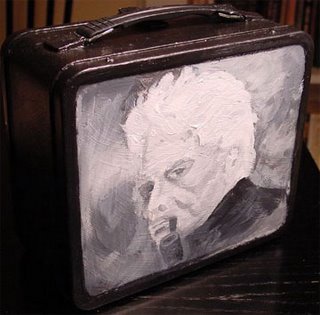
This is part of an email conversation I've been having with my friend Nate. He asks some very penetrating questions that keep me on my toes, theologically and philosophically, but he is acutely aware of the issues involved in the whole post-modern environment and the story of the emerging church.
I'm including it in this blog because I think the correspondence is an interesting topic.
Howard:
I've been reading over that round of essays between Merold Westphal and Douglas Groothius to try and get a better understanding of the opposing views (www.christiancadre.org/topics/postmodern.html). Here's what I'm grappling with: At the root, the debate between the two is epistemological. How do we know anything? And Westphal, if I'm reading him correctly, says we can only "know" our Christian truth by faith (perhaps I'm phrasing this carelessly).
Groothius says:
"..if Christian apologetics does its job, one may believe with justification absolute theological truths, such as 'Jesus is the Son of God.'"
I want to be charitable to Mr. Groothius point of view here, but it seems rather ridiculous to me to assert that we believe doctrines because of the scaffolding of logical syllogisms holding them up.
Rather, I hear Westphal saying that the basis of our certainty is the Word, which makes no attempt to justify His Authority. I'm reminded of Moses' question, asking the burning bush to identify itself. And the response he got was, "I am that I am." As a kid, it always seemed to me that that was a cop-out answer, but now I realize that God does not need to (indeed, cannot)
identify himself contingent with any other thing.
Humbling.
So where does that leave us? I'm fully able to comprehend the folly of Enlightianity, whoops, I mean modern epistemological structures, but how should we then live? I understand now that I stand on the Rock and nothing else (not even propositions), but how do I resist that becoming a private piety that does not affect my surroundings?
Nate
Nate:
Let me throw some thoughts at you. I want to use as my text the phrase:
Groothius says:
"..if Christian apologetics does its job, one may believe with justification absolute theological truths, such as 'Jesus is the Son of God.'"
Of course, he is saying nothing more here than we can make a propositional statement and believe them. I'm reminded of Barth and his dislike of apologetics (which is, ultimately, epistemological). Barth had a pretty low opinion of apologetics, as seen in this quote:
"Anxiety concerning the victory of the Gospel—that is, Christian Apologetics--is meaningless, because the Gospel is the victory by which the world is overcome. ... It [the Gospel] does not require representatives with a sense of responsibility, for it is as responsible for those who proclaim it as it is for those to whom it is proclaimed. It is the advocate of both. ... God does not need us."
Part of the quote speaks to the purpose of "evangelical apologetics," i.e., why do we do it?
Simply to win a debate and have someone make a decision to follow Christ? No need for revelation, eh? We can figure it out on our own.
Second, it also points to their view of scripture, which again Barth also takes to task: " "Holy Scripture as such is not the revelation. And yet Holy Scripture is the revelation, if and as far as Jesus Christ speaks to us through the witness of His prophets and apostles. Holy Scripture is a token of revelation... But there has never yet been a faith in the revelation which has passed by this token, a faith which was not rather awakened, nourished and controlled precisely through the instrumentality of this token."
As a writer has pointed out, by this paradox Barth maintains that the text of scripture cannot be equated/identified with revelation (since revelation is the person of God in Christ), but its witness to Christ can be used by Christ to reveal himself. The Bible finds its authority because of its content, because it is a witness to God in Christ who gives it such authority (I really like this!).
What Mr. Groothuis fails to reckon with is two issues. Again borrowing from Barth's thought: "His (Barth's)theological account of rationality called into question the legitimacy of any
(1) general view of rationality that does not take seriously the sinful perspectives of our knowing,
(2) account of knowing that imagines God as an ‘object’ perceivable through human striving."
What this means is that Groothuis assumes that apologetics "gets it right" and therefore we can trust these objective truths as much as we can scripture, and second, we can somehow share this "truth" with others and they will get it without the help of divine revelation or the presence of the HS. Since God is not an ‘object’ in the way other things are, God cannot be known in the same way as other objects.
And as someone else has pointed out, "how secure is a faith that is based on any kind of intellectual argument?"
I like what Cardinal Avery Dulles says: "Faith, therefore, is not a simple achievement of reason. It is the work of reason submitting to the word of God, which comes by way of revelation. God, as the infinite source of all that is or can be, lies immeasurably beyond all that we can infer from the created order.
His inner essence and intentions are known only to Himself unless He chooses to reveal them. For our sakes He has revealed something of Himself and His saving plans so that we may love and serve Him better.
God’s great and unsurpassable revelation of Himself is His Son, His eternal Word, who has become flesh in Jesus Christ. The Christian clings to that living and incarnate Word, in whom salvation is to be found."
Too often we claim to demonstrate by cogent arguments not only the credibility but the truth of Christian revelation. Barth, on the other hand, judged that apologetics by its very nature leads to compromise with unbelief. Apologists, he charged, seeking to make the gospel credible, marched onto the field carrying a white flag, and ended by surrendering essentials of the faith.
And we haven't got to postmodernism yet...
And now, just to muddy the waters even more, a lot of what passes as epistemology is actually metaphysics. For Heidegger, metaphysics is about existence, and when we move outside of existence, we tend to atomize existence into spirit, truth, being, matter, power, will, substance, subject and so on, thus we lose the truth of the thing and what existence is all about.
But to even do this assumes that there is a place in the world where we can stand (absolute truth?) in order to step out beyond this. What happens intellectually that we are at the edge of a cliff, so we stick a board out over the edge and anchor the other end into the ground. Then we tack another board on the end of that and move a little further forward, and do the same thing again (this is what is usually referred to as foundationalism).
So hopefully you can see the problem. It's one thing to stand on solid ground in one place and say something, but does that make our entire metaphysical journey as valid? Not only Heidegger, but Nietzsche (where Heidegger learned his metaphysics), Husserl, Levinas, Derrida, Foucault and most other Pomo philosophers battled this and tried to find a way around it. This metaphysics was Kant and Hume and Descartes at their best.
So, to put is simply, most metaphysics is saying that I have a ground or place to stand to say these things, and they are true. Heidegger (et al) said, oh, really?
So the battle is not only epistemological, but ontological and metaphysical as well, but you won't find Groothuis working in those categories.
Your comment about Moses' question to the bush is right on target, and intuitively hits at the heart of the issue. I doubt anyone else from your group could get what you mean, so be prepared to get clobbered.
Finally, your question below asks:
“I understand now that I stand on the Rock and nothing else (not even propositions), but how do I resist that becoming a private piety that does not affect my surroundings? “
I again refer you to N.T. Wright and his work, especially the big three volumes I mentioned in my last email. I've been there and I've been through the wilderness, and made my way back (I think I see some suburbs in the distance...), but it is a journey ultimately you will have to work out for yourself.
However, you don't need to walk it alone, you just need to find community and some good books by Brian McLaren, Don Miller (blue like Jazz), and Eric Sandras (Buck naked faith). You may like this quote from a blog of his:
Transitions
1:58 PM PST, February 28, 2006
“A couple weeks ago I was invited to speak at the University of Minnesota, Duluth. Of course, having failed my geography classes miserably in high school, I didn’t realize that visiting Duluth in mid February can be a frightfully chilling experience.
Being a window seat kinda guy, my view of my descent to Duluth positioned me right next to the landing wheels of our turbo propped United Express plane. As the snow covered tarmac approached I suddenly felt a bit uneasy. Staring at the tires, I realized that they where noticeably absent of any snow tread or even those cool little spiking things that half of Port Angeles puts on their tires at the first sign of snow.
So I’m thinking, “Traction is important on vehicles trying to stop on the snow. My 4-Runner has great snow tires and still slides sometimes. This plane is a lot heavier and moving a lot faster than my 4-Runner. Geez, where are those Les Schwab tire guys when I need ‘em?...”
Of course, the freakiest part of landing an airplane is that transition point. You know, that place when you haven’t quite landed, but aren’t really in the air? Or when you are taking off—you can feel the lift, but the plane is still on the ground. I stared at my bald tire friends out the window and realized that, during this transition time, my life was in their hands. I realized that there wasn’t a thing I could do to make that plane land safely. I couldn’t press done in my seat harder to make the plane heavier. I couldn’t flap my arms really, really fast in order to keep it aloft. Nope.
All I could do is have faith. Faith in those tires… faith in that plane… and most importantly faith in the pilot. The fact that you are reading this column is evidence enough that I made it through that snowy transition and landed safely.
Still the whole experience got me thinking about transitions in our lives. They seem to be some of the most awkward and nerve-racking experiences we as human have to endure. We like the status quo. We like things predictable and tidy. But life is not that gracious. It demands flexibility and change. Our kids grow up, our parent’s grow old, and our bellies grow wide. We move to different houses, different cities, and even into different lifestyles. Transitions occur in our lives at varying degrees and speeds. So the key to success is not avoiding awkward transitions, but learning how to handle them. Let me offer three things to keep in mind to help you land safely on the other side of change.
Focus: Keep in mind that every transition has a beginning, middle, and an end. Knowing where you are in the process and where you desire to be when it is over can help you make healthy and life giving decisions in the midst of it. This is especially important when transition surprises us. Without focus, the death of a loved one or a unexpected career change can cause us to make poor decisions that actually compound the problem instead of navigating it.
Friends: I see too many people in transition pull away and isolate themselves from others. Likewise the awkwardness of not knowing what to do, causes many of us to avoid those we know who are in transition. My advice, regardless of what side of the coin you are on—walk in the opposite spirit. Where your natural inclination may be to run and hide, or avoid and deny,
turn to pursue and love. Friends are gifts from above that add stability and sanity to our lives.
Faith: If I’m flying the plane myself, then the weight of success or failure depends on me. If I’ve entrusted my life to someone who knows it better than I even know myself, then faith dictates that I trust.
Jesus said that he was the Master of Life. By that very statement, I believe he means that he knows a lot about life. Not just church or offerings, but life. He knows a lot about marriage and parenting, about careers and callings, about love and loss, and a lot about the present and future. To let him be the master of my life means I get to be his apprentice and learn from him how to live this life—and live it abundantly.
So may your Faith, Friends, and Focus help you land safely through the next transition in your life. And if you happen to be on an airplane sometime in the future and see some guy flapping his arms trying to keep the plane in the air, just come remind me to listen to my own advice and trust the pilot. “
This will probably bounce because of the length or bandwidth, but hopefully I've made some sense.
howard







